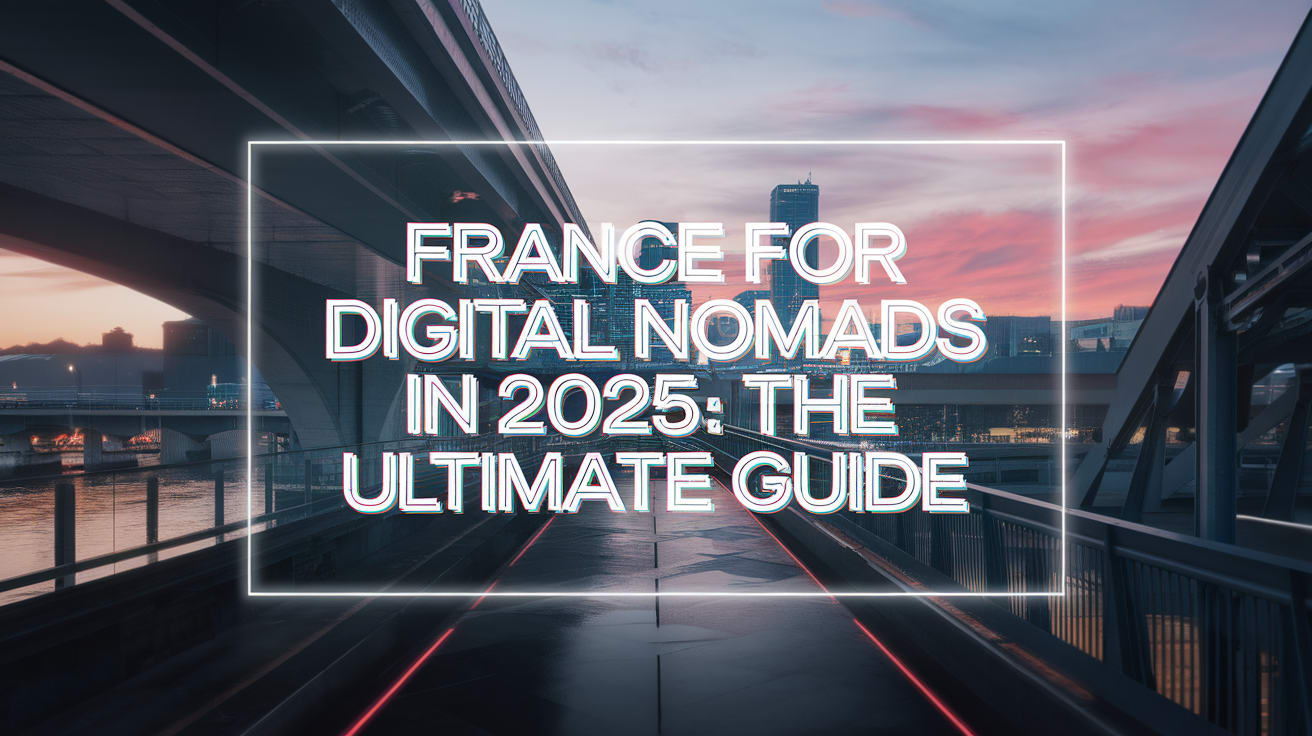France Digital Nomad Visa 2025
According to the BBC, the global remote work phenomenon has led to a surge in countries creating special visas to a...

France for Digital Nomads in 2025: The Ultimate Guide
Authority Insight: We grounded this article in guidance from Wikipedia and Bbc so every recommendation reflects the latest policy and on-the-ground expertise for France Digital Nomad Visa 2025.
According to the BBC, the global remote work phenomenon has led to a surge in countries creating special visas to attract location-independent professionals. For years, aspiring expats dreamt of swapping their home office for a Parisian café, fueled by blogs and forums suggesting a simple "visitor visa" was the golden ticket. If you've been planning your move based on that advice, it's time for a critical update. As of mid-2025, the landscape for digital nomads in France has fundamentally changed, and relying on outdated information could jeopardize your dream before you’ve even packed your bags. This guide is your new, definitive resource for navigating the French system in 2025, built on the latest official regulations.

Your 2025 Roadmap to Working Remotely from France
So, what exactly is the "France Digital Nomad Visa"? The simple, and slightly confusing, answer is that it doesn't officially exist—at least not by that name. Unlike countries like Spain or Portugal, France hasn't launched a dedicated visa with "digital nomad" in the title. However, it offers established, legitimate pathways for self-employed individuals and freelancers to live and work in the country legally. This is where the confusion, and the recent major changes, come into play.
For years, a popular workaround involved using the long-stay visitor visa (VLS-TS Visiteur). This was the path recommended on countless travel blogs and even by some relocation experts. But a major clarification from French authorities in 2025 has closed this loophole for good. As of June 1, 2025, it is explicitly forbidden to perform any professional activity, even for foreign clients, while on a visitor visa. This single change makes most online advice obsolete and re-routes all prospective digital nomads toward one primary visa category: the "Entrepreneur/Profession Libérale" visa. This guide is designed for you—the freelancer, the remote employee of a foreign company, or the online business owner—who needs to understand this new reality. We’ll cut through the noise and provide a clear, actionable plan based on the current rules, not the old workarounds.
What You Will Learn in This Guide
This article is your step-by-step manual for making your French dream a reality in this new regulatory environment. We'll leave no stone unturned. You will get:
- A Clear Breakdown of the Correct Visa: A deep dive into the "Entrepreneur/Profession Libérale" visa, the new default path for most digital nomads.
- Detailed Financial and Legal Requirements: We'll cover the exact income you need to prove (currently around €1,801.80 per month), the mandatory health insurance coverage of €30,000, and the essential business paperwork.
- The Complete Application Timeline: From gathering documents to the crucial post-arrival validation process in France, we’ll map out every step.
- An Honest Look at Taxes and Business Setup: Understand your obligations as a self-employed professional in France and how to structure your business correctly from day one.
- Expert Tips and Common Pitfalls: Learn from the mistakes of others to ensure your application is seamless and successful. Similar to the France Digital Nomad Visa 2025: The Complete Guide for Remote Workers and Freelancers, this visa offers competitive benefits.
The Old Way vs. The New Reality: Understanding the Shift
To fully grasp the current situation, it's essential to understand the past. For years, the path for a digital nomad to France was ambiguous. The government didn't have a specific policy addressing people who lived in France but earned income from foreign sources online. This gray area led to the rise of the "VLS-TS Visiteur" strategy. Applicants would secure this long-stay visitor visa by promising not to work in the French labor market, a vague commitment that many remote workers felt they could honor.
This old strategy is now definitively defunct, making a thorough understanding of the correct legal pathway more critical than ever. With the visitor visa loophole closed, let's dive into the details of the official route you must now take.
The "Profession Libérale" Visa: Your Pathway to Working Remotely in France

While France has not yet launched a visa specifically branded for "digital nomads," the established "Entrepreneur/Profession Libérale" (Liberal Profession) visa is the official and correct route for freelancers and self-employed individuals wanting to work remotely from France for more than 90 days.
Following a major regulatory update on June 1, 2025, it's crucial to understand that using a long-stay visitor visa for any kind of remote work is now explicitly forbidden. This shift makes the "Profession Libérale" visa the primary pathway for most remote workers.
Requirements & Eligibility Checklist
Getting your application right starts with a deep understanding of the requirements. French bureaucracy is thorough, so meticulous preparation is key. Here’s what you’ll need to prove.
Financial Stability
You must demonstrate that you have sufficient financial resources to support yourself without relying on the French state. The absolute minimum is based on the French minimum wage (known as the SMIC). If you're considering other European destinations, check out the Germany Digital Nomad Visa 2025: Complete.
- Minimum Income: You must prove a gross monthly income of at least €1,801.80. This is the legal floor.
- Recommended Income: To present a stronger application, most immigration advisors suggest showing a consistent income of €3,200 per month or more. This demonstrates a comfortable living standard and significantly improves your chances of approval.
- Proof: This is typically shown through bank statements for the last 6-12 months, client contracts, and detailed financial projections for your business.
Documentation Checklist
Prepare to gather a comprehensive file. While the exact list can vary slightly by consulate, your core documents will include:
- Completed Application Form: Filled out through the official France-Visas portal.
- Passport: Valid for at least three months beyond the expiry date of the visa, with at least two blank pages.
- ID Photos: Two recent, passport-compliant photographs.
- Proof of Accommodation in France: This can be a rental agreement, property title, or a letter from a host (
attestation d'accueil). - Business Plan: A detailed plan outlining your business, services, target clients, and financial projections for at least the first year.
- Proof of Business: This could include business registration documents, a professional portfolio, or letters from current clients.
- Letter of Motivation: A personal letter explaining why you want to live and work in France.
- Health Insurance: A private policy covering you for the duration of your stay with minimum coverage of €30,000 for medical emergencies and repatriation.
- Criminal Record Check: A background check from your country of residence, often required to be apostilled or translated.
The Step-by-Step Application Process
Navigating the application can feel daunting, but breaking it down into steps makes it manageable. Remember, you cannot apply more than three months before your planned departure date.
- Complete the Online Application: Start by filling out your application on the official France-Visas website.

While following these formal steps is essential, a successful application often hinges on going beyond the bare minimum. Understanding the nuances of the system and learning from the experiences of others can make all the difference between a rejection and an approval. Now that you know the official requirements, let's move from theory to practice.
Practical Guide: Navigating Your Move to France

Moving beyond the theory, this section provides actionable advice, real-world scenarios, and a clear cost breakdown to help you successfully navigate the French visa process in 2025. For a similar visa program, see our comprehensive Netherlands Digital Nomad Visa 2025: The Complete Guide (Why It Doesn't Exist & Better Alternatives) guide.
Expert Tips & Best Practices
After the significant regulatory shift on June 1, 2025, the old loopholes have closed. Success now depends on meticulous preparation. Here are some insider strategies to ensure your application stands out.
- Front-Load Your Business Admin: For the
Entrepreneur/Profession Libéralevisa, you are essentially applying to run a business in France. Start the process of registering with URSSAF (the French social security and tax collection body) before your visa appointment. Having a registration number or at least proof of application demonstrates serious intent. This is a crucial step that many applicants overlook. - Exceed the Financial Minimum: The official income requirement is the French minimum wage (around €1,802/month). However, experienced immigration advisors and successful applicants recommend showing proof of funds closer to €3,200 per month. This isn't just about meeting a requirement; it's about convincing the consulate that you can thrive, not just survive, in France. Present at least six months of bank statements clearly showing this consistent income.
- Craft a "France-First" Business Plan: For the Passeport Talent, the new pre-approval from the Ministry of Economy is a major hurdle. Your business plan cannot be a generic startup pitch. It must be "real and serious," which means demonstrating how your business will contribute to the French economy. Include projections, potential French clients, or how you might engage with the local business ecosystem.
- Get Your Insurance Right: While the minimum health insurance coverage is €30,000, this is primarily for the visa application itself. Purchase a policy that is compliant with French requirements for long-stay visas and will adequately cover you for your first few months before you're fully integrated into the French healthcare system.
Real-World Scenarios: Learning from Others
Let's look at two hypothetical but realistic examples of digital nomads navigating the new 2025 system.
Case Study 1: The Successful Freelance Designer
- Applicant: Anya, a 32-year-old freelance graphic designer from Canada with a steady client base.
- Visa Path:
Entrepreneur/Profession LibéraleVisa. - What She Did Right: Three months before her intended move, Anya hired a French-speaking assistant to help her pre-register her freelance activity with URSSAF. For her visa application, she provided bank statements showing an average monthly income of €4,000 for the past year, well above the minimum. She also included letters of intent from two of her largest clients, stating their intention to continue working with her after her move to Lyon. The consulate saw a well-prepared, financially stable professional, and her visa was approved in six weeks.
- Lesson Learned: Proactively engaging with French administrative systems before applying makes your case significantly stronger. You might also be interested in our guide to the Netherlands Digital Nomad Visa.
Case Study 2: The Tech Founder's Hurdle
- Applicant: Ben, a 40-year-old tech entrepreneur from the USA wanting to launch a new SaaS platform from Paris.
- Visa Path: Passeport Talent – New Business.
- The Challenge: Ben's initial business plan was rejected during the new Ministry of Economy pre-approval stage. It was seen as too generic and lacked specific ties to France. After consulting with an advisor, Ben revised his plan to include hiring two French interns within the first year and partnering with a local tech incubator. His second submission was successful.
- Lesson Learned: For business-creation visas, demonstrating a tangible, positive impact on the French economy is non-negotiable.
Further Reading & Sources
- En.Wikipedia.Org – Digital Nomad
- En.Wikipedia.Org – Travel Visa
- Bbc.Com – News
- Fragomen.Com – France Digital Nomad Visa Visitor Visa Or How To Apply.Html
- Fabexpat.Com – 2025 French Visa Changes Explained Remote Work Talent Permits More
- Feather-Insurance.Com – Digital Nomad Visa France
- Greysonferguson.Medium.Com – An All New Digital Nomad Visa Is Coming To Europe 27349841B2Eb
- Nomadcapitalist.Com – Best Eu Based Digital Nomad Visas
- Connectpls.Com – France Digital Nomad Guide 2025
- Freelancermap.Com – Digital Nomad Visa
- Gigsky.Com – Easiest European Countries To Get A Nomad Visa
- Freakingnomads.Com – France Digital Nomad Visa
Final Reminder: Stay compliant with france digital nomad visa 2025 requirements to protect your move.